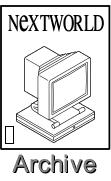 |  |  |  |  |  |  |
| | | | |

|

|
|
| |
March 1992 |
|
 |
|

|
 |
NeXT buyers become sellers
by Eliot Bergson
In what could become an emerging trend in the NeXT marketplace, two corporate users of the platform have spun off software companies to sell their mission-critical custom applications to other firms.
Phibro Energy, a commodities trader located in Greenwich, Connecticut, launched MC2 Technologies to market their "fully integrated" oil-trading software package, according to Vinnie Annunziata, president of the start-up.
"What we're doing is unique, from A to Z: trade capture, scheduling, keeping track of positions, credit and treasury, contract generation, and a link to accounting. If there had been software to do all these things on one platform, we would have bought it," he said.
Plans call for the firm to begin marketing and advertising in the summer, but word of mouth has already produced "big interest," according to Annunziata. "Traders are always on the phone with each other. They've been our best advertisers," he said.
The law firm of Marger Johnson McCollom & Stolowitz, in Portland, Oregon, also experienced a similar word-of-mouth success. When other law firms began showing interest in InteliDock, a legal-docketing application, Marger Johnson spun-off Inherent Technologies, and tapped Gregory Miller as president.
"When the firm got inundated with requests for information, they said, 'This is fun, but off the corporate charter. We have to focus on practicing law.' They asked me if I wanted to practice software again," Miller said.
Miller joined up with Giuseppe Cerbone, a database expert currently on assignment with NASA Ames Research Center, to develop SILC, a relational database server for legal docketing, billing, and time-keeping.
"Most legal apps run on closed, proprietary databases. They can't talk to each other. They all wanted an open database that any app could tie into. So we decided to drive the market," Miller said.
Miller found the same high interest at a conference of NeXT users in the legal field in Denver in late February, but says that spinning off a software company may not be for every company or type of business. "The thought of say, gas stations, running a software company might be weird. You have to decide if development is strategic enough to get to market," he said.
Annunziata agreed. "Most companies use computers to target one department or division. Our project is strong because it encompasses an entire company, a whole system. With only parts, everything has to be reconciled. That leads to lots of headaches," he said.
Each company has to decide whether their type of business will allow it to both develop and market their software product. Whereas MC2 Technologies can easily market their software because of heavy contact between traders in the industry, Miller indicated that Inherent Technologies didn't want to get headaches from manufacturing or marketing the software.
"Because the firm itself was a great beta site, we got tremendous feedback. We've leveraged that into our finished product. Now we can bring it to a software publisher and get it published and sold," Miller said.
Miller added that this trend might lead to a robust software-publishing industry. "The software publishers may be the big winners in all this," he said.
|
|